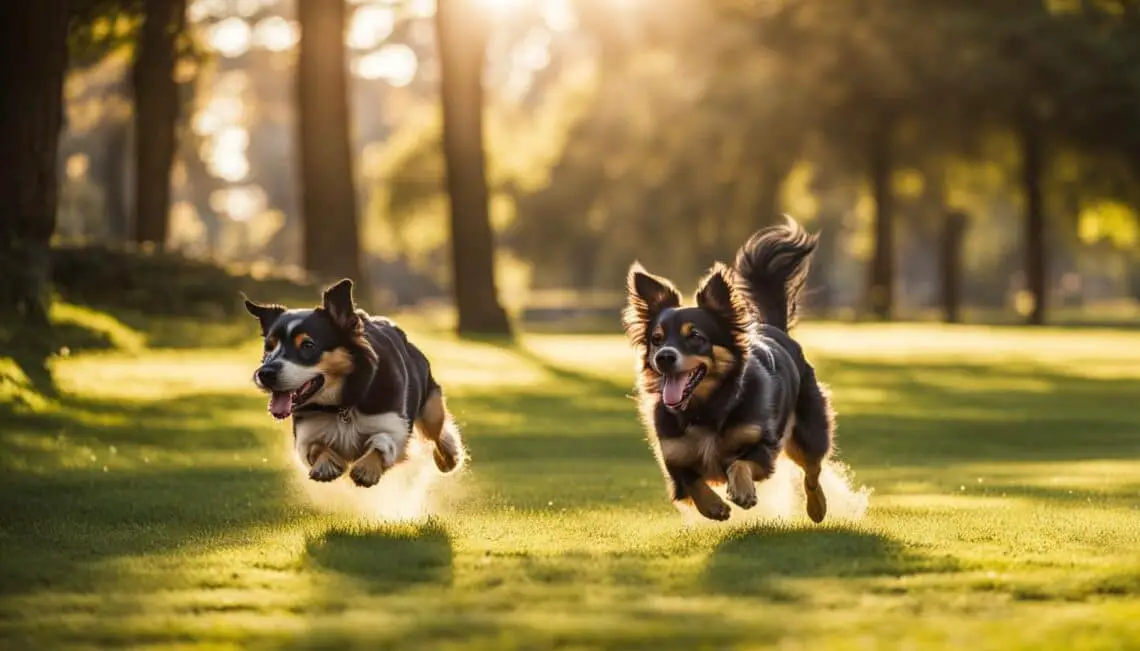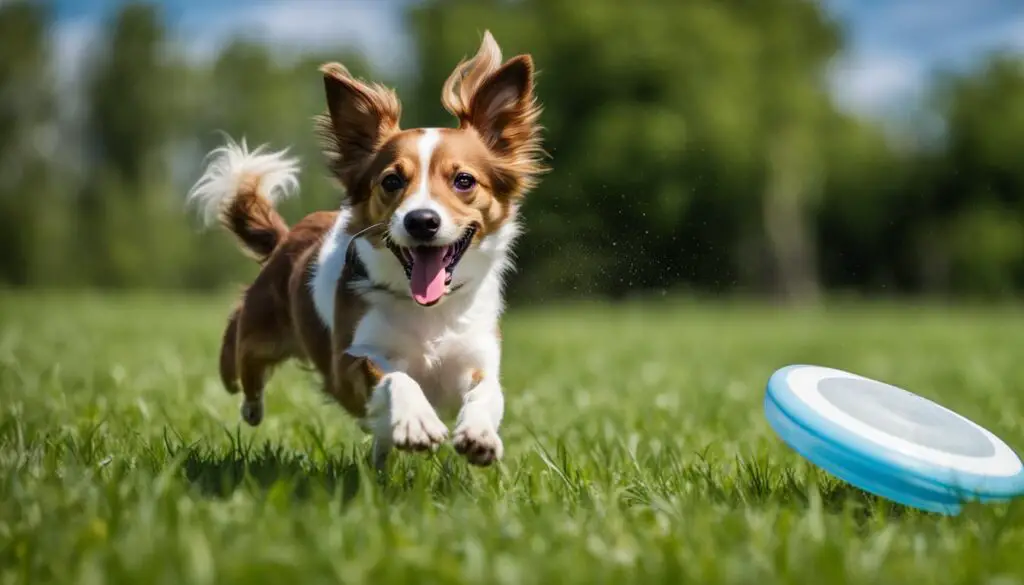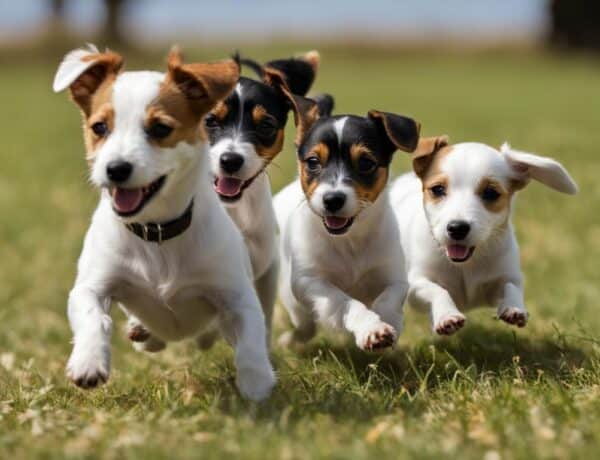When it comes to exercise needs, it’s important to remember that every dog is unique, regardless of their size. Even small dog breeds, like chihuahuas, require regular exercise to maintain their health and happiness. Veterinary surgeon Dr. Courtney Campbell recommends a minimum of two 20-minute walks per day for all dogs, including small breeds.
However, it’s essential to consider specific circumstances that may affect exercise requirements. Factors such as age, medical conditions, or brachycephalic breeds may necessitate alternative exercises. For example, puppies should wait until their growth plates close before engaging in vigorous exercise.
Small dogs, like chihuahuas, are built for running and can engage in various activities to stay active. These may include jogging, swimming, playing with other dogs, and sprinting up hills. Interactive toys with low-calorie treats can also provide exercise for reluctant small dogs.
Key Takeaways:
- Exercise is essential for small dog breeds, such as chihuahuas, to maintain their overall health and well-being.
- Two 20-minute walks per day are recommended for all dogs, including small breeds.
- Specific circumstances such as age, medical conditions, or brachycephalic breeds may require alternative exercises.
- Small dogs, like chihuahuas, can engage in activities like jogging, swimming, playing with other dogs, and sprinting up hills to stay active.
- Interactive toys with low-calorie treats can provide exercise for reluctant small dogs.
Exercise Recommendations for Small Sporting Breeds
Sporting breeds are known for their high energy levels and athletic abilities. Small sporting breeds, like German Shorthaired Pointers, Labrador Retrievers, Nova Scotia Duck Tolling Retrievers, and Golden Retrievers, are no exception. These dogs require regular exercise to keep them physically and mentally stimulated. Without proper exercise, they may exhibit destructive behaviors due to pent-up energy.
German Shorthaired Pointers are one of the most energetic small sporting breeds and need at least two hours of varied exercise every day. This can include activities like running, swimming, retrieving, and playing fetch. The exercise should be both physical and mental to engage their active minds.
Labrador Retrievers and Nova Scotia Duck Tolling Retrievers also have high exercise needs and should have at least one to two hours of vigorous activity daily. This can include long walks, jogs, hikes, and playing fetch in a spacious area. These breeds excel at retrieving games and enjoy participating in dog sports like agility or flyball.
Golden Retrievers and other small sporting breeds should have more than an hour of rigorous exercise each day to prevent obesity. This can include long walks or jogs, swimming, and interactive games like hide and seek or puzzle toys. These breeds are known for their love of water, so swimming can be an excellent exercise option for them.
| Breed | Exercise Needs |
|---|---|
| German Shorthaired Pointer | At least 2 hours of varied exercise |
| Labrador Retriever | 1-2 hours of vigorous activity |
| Nova Scotia Duck Tolling Retriever | 1-2 hours of vigorous activity |
| Golden Retriever | More than 1 hour of rigorous exercise |
Key Points:
- Small sporting breeds require regular exercise to prevent destructive behaviors.
- German Shorthaired Pointers need at least 2 hours of varied exercise daily.
- Labrador Retrievers and Nova Scotia Duck Tolling Retrievers require 1-2 hours of vigorous activity.
- Golden Retrievers and other small sporting breeds should have more than 1 hour of rigorous exercise to prevent obesity.
Providing sufficient exercise for small sporting breeds is crucial for their physical and mental well-being. Engaging them in activities like running, swimming, playing fetch, and participating in dog sports will help fulfill their exercise needs and keep them happy and healthy.
Exercise Needs for Small Working and Herding Breeds
When it comes to small working and herding breeds like German Shepherds and Border Collies, their energy and intelligence necessitate a consistent exercise regimen. These small breeds thrive with 60-120 minutes of exercise every day to maintain their physical and mental well-being.
German Shepherds, known for their versatility and loyalty, benefit from a combination of activities. Regular brisk walks, engaging in dog sports, and providing mental stimulation through puzzle toys and training sessions satisfy their exercise needs effectively.
Similarly, Rottweilers require ample physical and mental exercise to prevent boredom and unwanted weight gain. Activities such as long walks, jogging, and interactive games like fetch can provide the necessary stimulation for these powerful and intelligent dogs.
For Bernese Mountain Dogs, a minimum of one hour of exercise is essential to keep them fit and healthy. This can include walking, hiking, or playing in a safely enclosed area. Regular exercise helps prevent obesity, a common issue for these gentle giants.
Terriers and hounds, such as Airedales and Beagles, also fall under the category of small working and herding breeds. These breeds require moderate activity levels, approximately 60-90 minutes of exercise per day. Brisk walks, playtime with interactive toys, and activities that stimulate their keen sense of smell are ideal for meeting their exercise needs.
It is crucial to understand the specific traits and requirements of each small working and herding breed in order to tailor an exercise routine that suits their individual needs. By providing them with adequate physical and mental stimulation, we can ensure that these intelligent and active small breeds lead happy and healthy lives.
FAQ
What exercise do small dogs need?
Small dogs, including breeds like chihuahuas, require regular exercise. They should have a minimum of two 20-minute walks per day. Other activities like jogging, swimming, playing with other dogs, and sprinting up hills can also be beneficial. Interactive toys with low-calorie treats can provide exercise for reluctant small dogs.
How much exercise do small sporting breeds need?
Small sporting breeds, such as German Shorthaired Pointers, Labrador Retrievers, Nova Scotia Duck Tolling Retrievers, and Golden Retrievers, need at least one hour of exercise per day. German Shorthaired Pointers require two hours of varied exercise daily, while Labrador Retrievers and Nova Scotia Duck Tolling Retrievers need one to two hours of vigorous activity. Golden Retrievers and other small sporting breeds should have more than an hour of rigorous exercise to prevent obesity.
What exercise do small working and herding breeds need?
Small working and herding breeds, like German Shepherds, Border Collies, Rottweilers, Bernese Mountain Dogs, Airedales, and Beagles, require 60-120 minutes of exercise every day. German Shepherds can benefit from brisk walks, dog sports, and mental stimulation. Rottweilers need plenty of physical and mental exercise to prevent boredom and weight gain. Bernese Mountain Dogs require at least an hour of exercise to maintain a healthy weight. Terriers and hounds, like Airedales and Beagles, also have medium exercise needs and should be given moderate activity for 60-90 minutes daily.






No Comments